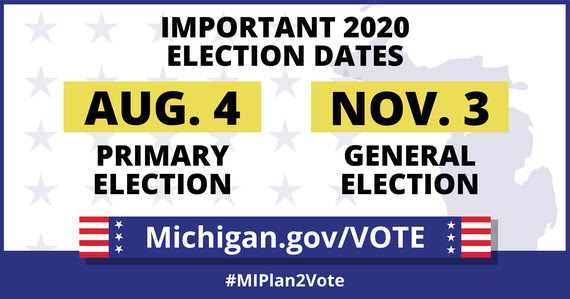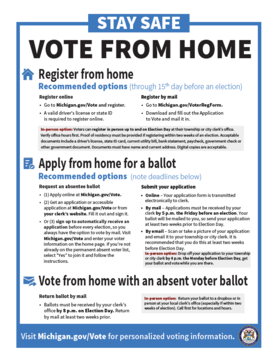|
Press Release
FOR IMMEDIATE RELEASE: July 29, 2020
CONTACT: Lynn Sutfin, 517-241-2112, SutfinL1@michigan.gov
Opioid overdoses surge during COVID-19 pandemic;
MDHHS promotes treatment and resources
LANSING, Mich. – Emergency Medical Services (EMS) and emergency departments (EDs) in Michigan have both seen substantial increases in opioid overdoses since the beginning of the COVID-19 epidemic. These increases are a tragic reminder of the continued toll of the opioid epidemic, and the Michigan Department of Health and Human Services (MDHHS) urges anyone with opioid use disorder to carry naloxone and practice other safety measures to prevent overdose deaths.
According to statistics gathered by MDHHS, EMS responses for opioid overdose increased by 33 percent from April to May of this year. Additionally, EMS responses for opioid overdoses from April through June 2020 were 26 percent higher than the same period in 2019. EMS responses for opioid overdoses increased for all regions and nearly all demographic groups, with the exception of residents aged 65 years and older.
“Opioid overdoses kill far too many Michiganders, and it’s a double tragedy that the pandemic has exacerbated this crisis,” said Dr. Joneigh S. Khaldun, chief deputy for health and chief medical executive. “If you or someone you love has an opioid use disorder, please take steps to prevent overdose deaths – like carrying naloxone and never using alone.”
The data provides other insights on how the pandemic has impacted the opioid crisis. Patients were more likely to refuse transport to EDs in April to June compared to the same period in 2019. The percentage of opioid overdose EMS responses that resulted in the patient declining transport to EDs nearly doubled from 7.7 percent April to June 2019 to 14.3 percent April to June 2020.
While all racial groups demonstrated increases in opioid overdoses and transport refusals during the pandemic, preliminary data suggests white residents experienced the greatest increases during this period. Despite this finding, longstanding racial disparities continue to impact how black residents experience opioid overdoses, resulting in a far higher opioid overdose rate. The average monthly rate of EMS responses for opioid overdoses among black residents was 219.8 per 100,000 residents, as compared to 123.4 among white residents between April and June.
After an initial drop in April, ED visits for opioid overdoses increased in May and June to pre-pandemic levels despite EDs seeing fewer visits overall in Michigan during the pandemic. The total number of ED visits April to June 2020 declined 38 percent compared with April to June 2019, while the number of opioid overdose ED visits increased by 2 percent. It is too early to determine if opioid overdose deaths have increased following the onset of the pandemic due to the length of time required to finalize death certificates.
MDHHS continues to use every available tool to combat the opioid epidemic during this challenging time, including ensuring continued access to Syringe Service Programs (SSPs) and increasing access to naloxone, the medication used to treat overdoses, for individuals and organizations. Treatment for opioid use disorder, which may include medications used to combat the effect of opioids on a person’s brain, remains available. For individuals who are not ready to access treatment, MDHHS also recommends safer drug use to prevent further injury and death due to overdose during this time. MDHHS urges Michiganders to use the following treatment and safer drug use resources:
If you or someone you know has an opioid use disorder:
- Access resources to support the mental and physical health of those with substance use disorder during the COVID-19 pandemic.
- Contact your primary care provider before you run low on necessary medications.
- Ensure naloxone is readily available. Naloxone for All and NEXT Distro will mail naloxone at no cost to anyone in Michigan. Individuals can request naloxone online. MDHHS has also created an online naloxone portal where community organizations can request free naloxone.
- Practice safer drug use (safety practices that prevent overdose deaths) and encourage others to do the same. More information is available in Safer Drug Use during the COVID-19 Outbreak.
- Never Use Alone is a service anyone can call while using drugs. The caller will be connected to a person who will seek emergency services for them if they drop off the line or don’t respond to a return call. Call 800-484-3731 or visit NeverUseAlone.com to learn more.
- Find an SSP near you that can provide sterile needles, naloxone and other life-saving resources.
If you or someone you know would like to seek treatment for opioid use disorder:
If you or someone you know is in recovery:
- Reach out with a phone call, text or email to let him or her know you are there. Model good coping behaviors yourself.
- Share the COVID-19 hotline number (888-535-6136) and tell them to press “8” for free emotional support counseling.
- Direct them to Michigan.gov/StayWell for a list of other help lines, including a peer “warm line” for individuals in distress who want to talk to someone who understands substance use disorders, the National Disaster Distress Helpline at 800-985-5990 and the National Suicide Prevention Lifeline at 800-273-8255.
- Call 211. Anyone struggling or seeking resources for substance use treatment services can call this free service that connects Michigan residents with health resources in their communities.
For more information about overdoses and resources for prevention and treatment, visit Michigan.gov/Opioids. |










 Applying for an absent voter ballot
Applying for an absent voter ballot
